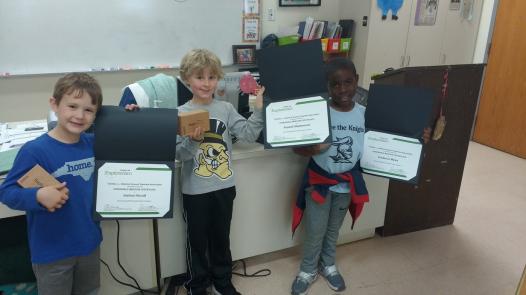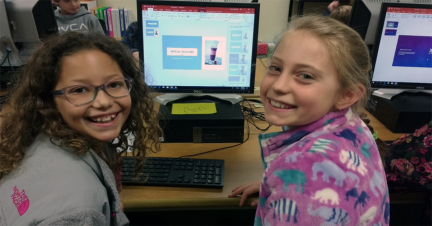4 Ways Rural Science Teachers Can Encourage a Global Mindset
As a science teacher in a small town, it’s hard to imagine that I can have an impact beyond the walls of my classroom. Even more so, the students I teach feel like they don’t have much of an impact on the world around them. To counter this, I try to have my K-6 students think about global issues and how they could solve them. ExploraVision is one of the best methods to get people out of their comfort zones and use their imagination in structured ways.
Last year, I worked with our teachers at Greenfield School in rural Wilson, NC, to submit more than 40 K-6 ExploraVision projects. But here’s where it gets interesting: it was our first time entering! Due to the tight-knit community of our school, it created a fun competition among the student body and increased the volume of entries. When our students feel engaged, they tend to be more open to possibilities—one of the top aspects of project-based learning.
I have a few recommendations for elementary school teachers looking to help their students refine critical thinking skills through the competition.
1. Familiarize Yourself with ExploraVision
I spent some time looking through the ExploraVision website to see examples of past years’ projects, learn about submission formats and view key deadlines. I couldn’t imagine spending weeks on a project only to be disqualified because it was duplicative, incorrect or too late! The classroom lesson plans linked on the homepage were especially helpful. If internet access is spotty in your town, projects can be “snail mailed.”
2. Build Excitement in the Classroom
I found some short YouTube clips of child inventors (age appropriate) and played several of them to inspire my students. I also showed them the various deadlines for finding out if they won an honorable mention and they were well aware that everyone who participated earned a prize and certificate. Many of the students were especially motivated to work very hard to try and earn the top prizes. A great idea can come from anywhere—not just a big city!

First Grade Honorable Mention winners: “The Color Changing Fork”
3. Serve as a Project Manager for Younger Students
I kept my students organized by limiting group size and selecting teams that would work well together. I was very purposeful with every class period and made my expectations clear. Each team had a checklist of the items that they needed to accomplish and a timeline for when each step was due. Work, research, drawings and handwritten segments of the paper were all kept in a classroom folder.
4. Demonstrate How a Growth Mindset Can Solve Challenges
To help each team narrow down and contextualize their ideas, each team brainstormed 10 problems in their life (sick grandparents, something that bothered them, or even a problem at school). Once they had a list of problems, I encouraged them to think of an invention that could solve the problem. Out-of-the-box thinking is recommended!
Motivating students
Last year we submitted more than 40 projects and received 14 honorable mentions. Here are some highlights:
• Color changing fork to prevent burning one’s mouth
• Facial recognition cabinet to prevent children from accessing firearms and medicine
• Captioning contact lenses for deaf individuals
• Tankless scuba tank system

5th Grade students designing their project website in PowerPoint.
This year, I have students who I no longer teach approach me with an idea they thought up over the summer. They’ve asked to come and meet with me at lunch and do the project on their own time because they are so excited about the possibilities of the contest. I’ve also had parents email me ideas their kid has come up with and already have a list of more than 25 invention ideas. In my opinion, anything that can elicit that kind of excitement is worth the time and effort to put into it.
ExploraVision is a wonderful introduction to scientific research and creative writing that also embraces an authentic cross-curricular connection. It is rare to see a group of students working collaboratively and staying on task for days on end, but that is exactly what this project delivered.
Download these powerful K-12 science lesson plans to get started!
About the Author
Covey Denton is a science teacher at Greenfield School in Wilson, NC. As the only elementary science educator at her school, she empowers other teachers to recognize applicable ways to incorporate ExploraVision skills into their curriculum. Follow Covey on Twitter and learn about other ExploraVision ambassadors.